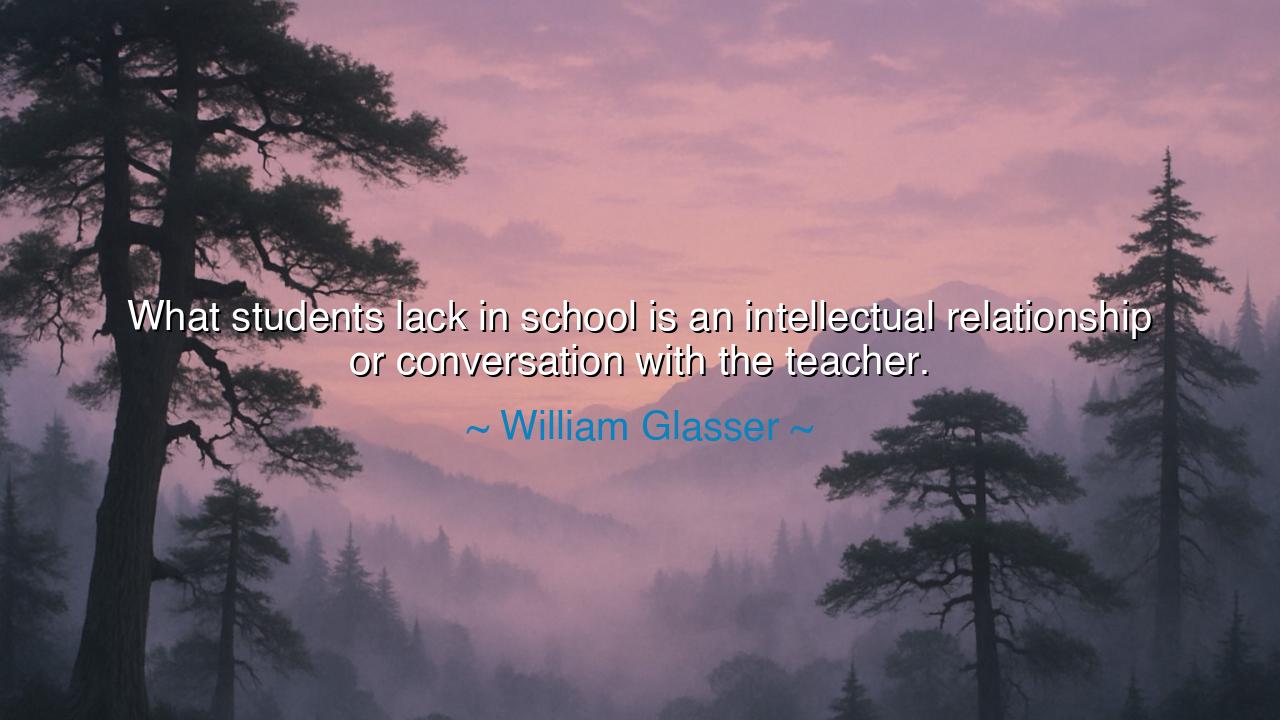
What students lack in school is an intellectual relationship or
What students lack in school is an intellectual relationship or conversation with the teacher.






Hearken, children of learning and seekers of wisdom, and listen to the words of William Glasser, who, with the keen eye of a sage, discerned the hidden ailment of modern education: "What students lack in school is an intellectual relationship or conversation with the teacher." Herein lies a truth both simple and profound: that knowledge alone, delivered in lectures or texts, is but a shadow of true learning. The spark that ignites the mind is found not in rote repetition, but in the dynamic exchange between the seeker and the guide, where questions are raised, doubts confronted, and ideas intertwine in living discourse.
Consider the ancient Athenian academies, where Socrates walked among his pupils. It was not the mere presentation of philosophy that mattered, but the Socratic dialogue—the constant questioning, the challenges, the intellectual intimacy between teacher and student. Each conversation was a forging of the mind, an awakening of curiosity, a cultivation of reason. Glasser reminds us that without such engagement, students are left to wander through information, yet remain starved for understanding, for the human connection that makes knowledge alive.
In schools today, students often encounter teachers who speak as if through a veil, delivering facts and procedures without entering into the realm of thought alongside them. The essence of Glasser’s observation is that learning thrives in relationship, in mutual exploration, in the shared journey of inquiry. A teacher becomes not merely a transmitter of facts, but a companion of the mind, guiding, challenging, listening, and provoking deeper reflection.
Let us recall the story of Albert Einstein in his youth, often frustrated with rote instruction, until he encountered mentors who engaged him in conversation, who challenged his thinking, and who allowed him to question freely. It was in these intellectual relationships that his curiosity blossomed, and the seeds of genius took root. Glasser’s insight echoes this principle: education without dialogue is incomplete, for it deprives the student of the living spark of thought that comes from exchange and interaction.
The phrase “intellectual relationship” is key. It is not about mere authority or discipline, nor is it about admiration or social proximity. It is the meeting of minds, where the teacher’s wisdom intersects with the student’s curiosity, creating a fertile ground for discovery. In this space, ideas can be challenged, refined, and transformed, and the student emerges not merely informed, but empowered to think critically, to reason independently, and to pursue truth with vigor.
From Glasser’s teaching, we learn that the role of a teacher is sacred: to listen, to respond, and to enter the world of the student’s mind. The true measure of education is not the volume of knowledge delivered, but the depth of the intellectual bond forged. The classrooms that cultivate these bonds are those where questions are welcomed, discussion is encouraged, and the teacher’s presence is felt not as authority alone, but as companion and guide.
Practical action follows: as a student, seek out dialogue with those who can stretch your mind; ask questions, challenge assumptions, and remain curious. As a teacher, enter into the lives of your students’ minds, listen with patience, respond with thought, and invite them to explore alongside you. Let every lesson be a conversation, every classroom a forum of minds, and every teacher-student encounter a symphony of inquiry.
Thus, Glasser’s words transcend time: the heart of education lies not in memorization or lecture, but in the intellectual relationship, the sacred conversation, where the mind awakens, curiosity flourishes, and wisdom is passed from generation to generation. Let all who teach and all who learn heed this call, for in dialogue lies the true immortality of thought.
If you wish, I can also craft a narrative audio-ready version of this passage, where the rhythm mirrors the rise and fall of a living conversation, evoking the emotional resonance of Glasser’s vision. Do you want me to do that?






AAdministratorAdministrator
Welcome, honored guests. Please leave a comment, we will respond soon